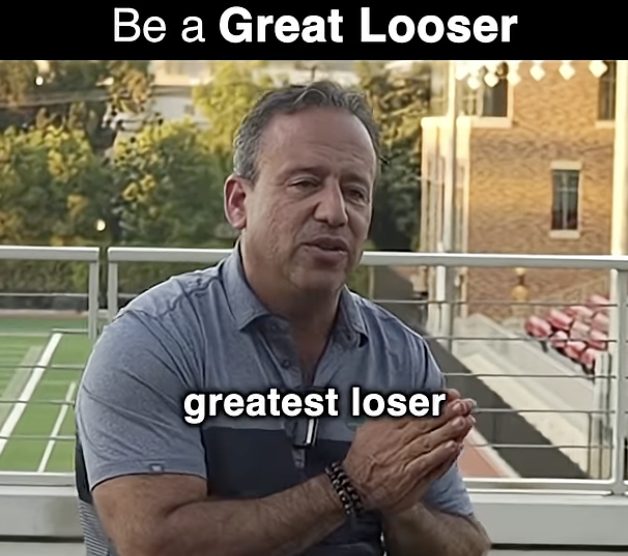Why I Call Myself the Greatest Loser
There are two simple reasons I proudly claim this title:
- I lose all the time, which means I’ve gotten really good at it
- Every time I lose, I actually win because I learn something valuable
This perspective shift has been fundamental to my success. In the sports and entertainment industry, where I built my career, losses are inevitable. Whether negotiating contracts or making investment decisions, not everything works out as planned.
But here’s what I’ve discovered: those who fear losing often miss the biggest opportunities. They play it safe, stick to what they know, and ultimately limit their potential.
Learning to Lose Effectively
Losing effectively isn’t about celebrating failure—it’s about extracting value from it. When I look back at my biggest business setbacks, each one taught me critical lessons I couldn’t have learned any other way.
For example, early in my career, I lost a major client because I focused too much on the deal and not enough on the relationship. That painful loss taught me that sustainable success comes from genuine connections, not just transactions.
The most successful people I know aren’t those who avoid losing—they’re the ones who lose fast, learn quickly, and adjust immediately.
This approach requires humility. You must be willing to admit when you’re wrong and analyze what happened without ego or defensiveness. It’s not easy, but it’s incredibly powerful.
Reframing Failure as Research
I now view every loss as research—valuable data that helps me refine my approach. This mental shift transforms losing from something to fear into something to leverage.
When you embrace this mindset, you’ll notice three immediate benefits:
- You take more calculated risks because you’re not paralyzed by fear of failure
- You recover faster from setbacks since you’re focused on the lesson, not the loss
- You develop greater resilience as losing becomes part of your growth process
This approach has served me well throughout my career, from my time as CEO at Leigh Steinberg Sports & Entertainment to my current role as Chairman of the Napoleon Hill Institute.
Becoming a Great Loser
So how do you become a great loser? Start by changing your relationship with failure. When something doesn’t work out, resist the urge to hide, deny, or blame. Instead, ask yourself: “What can I learn from this?”
Document your losses and the lessons they taught you. Over time, you’ll see patterns emerge that help you make better decisions. You’ll also build confidence in your ability to handle setbacks, which makes you more willing to pursue ambitious goals.
Remember that losing isn’t the opposite of winning—it’s part of the winning process. Every significant achievement in history came after numerous failures and adjustments.
I challenge you to become a great loser. Embrace the process, extract the lessons, and watch how it transforms your results. In the end, those who learn to lose effectively ultimately win more than those who try to avoid losing altogether.
Frequently Asked Questions
Q: Isn’t it counterproductive to identify as a “loser”?
Not at all. When I call myself a “great loser,” I’m reframing what losing means. I’m not identifying with failure as my permanent state, but rather acknowledging my ability to handle setbacks productively. This mindset actually builds confidence because you know you can handle whatever comes your way.
Q: How do you distinguish between useful failures and just making mistakes?
All failures can be useful if you approach them correctly. The key difference is what you do after. A mistake becomes a useful failure when you take time to analyze what happened, extract the lesson, and adjust your approach. Without this reflection process, you’re just repeating mistakes rather than failing forward.
Q: How long did it take you to develop this relationship with failure?
This was a gradual evolution throughout my career. My biggest mindset shift happened after experiencing significant financial setbacks. Instead of being destroyed by these losses, I realized they provided insights I couldn’t have gained any other way. The transformation didn’t happen overnight, but the more I practiced viewing losses as research, the more natural it became.
Q: What’s the biggest business lesson you’ve learned from a failure?
That relationships matter more than transactions. Early in my career, I was focused on closing deals rather than building genuine connections. A major failure taught me that sustainable success comes from creating value for others first, rather than focusing primarily on what I could gain. This principle has guided my approach to business ever since.
Q: How do you help others adopt this “great loser” mindset?
I encourage people to start small by intentionally putting themselves in situations where they might fail but where the stakes aren’t too high. This builds the “failure muscle.” I also recommend keeping a failure journal to document what you learn from each setback. Over time, you’ll see how these lessons connect and contribute to your growth. The key is creating an environment where people feel safe acknowledging failures without fear of judgment.







